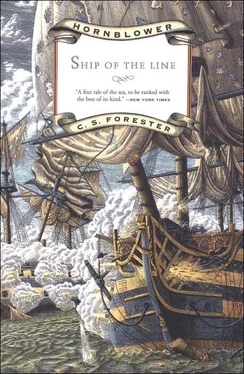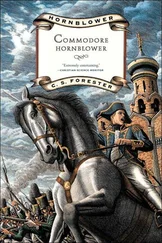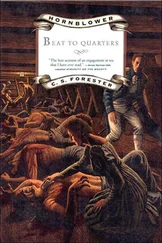“I fancy his fire’s slackening, sir,” said Bush. “It doesn’t surprise me.”
The Sutherland had not suffered mortally yet, judging by the number of dead on the maindeck. She could still fight for a long time yet.
“See his main mast, sir!” yelled Bush.
His main topmast was bowing forward, slow and dignified, with the topgallant mast bowing further forward still. Through the smoke they could see the main mast inclining aft. Then all dignity left the soaring mass of spars and canvas. It hung S-shaped in the air for a breathless second, and then tumbled down with a rush, fore and mizzen topmasts falling with it. Hornblower felt a grim satisfaction at the sight—there were no spare main masts to be had in Rosas. The Sutherland’s crew cheered piercingly, and hastened to fire in a few last shots as their ship drew ahead of her crippled opponent. A minute later the din of the firing ceased, the tiny breeze blew away the smoke, and the sun came shining through upon the littered deck again.
Aft lay their late antagonist, a great mass of wreckage trailing alongside, the second lower deck gun from the bow pointing out of its port at an impossible angle of elevation to show she had one gun at least knocked useless. A quarter of a mile ahead was the first ship they had fired into; she had paid no attention to the duel behind her but had continued under all sail for the safety of Rosas Bay, just like a Frenchman. And beyond her, sweeping round the horizon, were the cruel mountains of Spain, and the white roofs of Rosas were clearly visible above the golden shore. The Sutherland was close to the wide mouth of the bay; half way between her and Rosas lay two gigantic beetles on the flat blue surf ace—gunboats coming out of Rosas under sweeps.
And close astern of the crippled ship came the other two ships of the French squadron, the three-decker with the vice-admiral’s flag and a two-decker in her wake. It was the moment for decision.
“Masthead there!” hailed Hornblower. “Can you see anything of the flagship?”
“No, sir. Nothing but Cassandra .”
Hornblower could see the Cassandra’s royals himself, from the deck, pearly white on the horizon; the Pluto and Caligula must still be nearly twenty miles away—possibly becalmed. The tiny breeze which was urging the Sutherland into the bay was probably a sea breeze; the day was hot enough for that. Leighton would hardly arrive in time to take part in this battle. Hornblower could put his ship about now, and tack into safety, beating off the two enemies if they interfered with him, or he could throw himself into their path; and with every second carrying him a yard nearer Rosas he must decide quickly. If he fought, there was the faintest possible chance that Leighton might be brought up in time to pick up the cripples, but so faint a chance as to be negligible.
The Sutherland would be destroyed, but her enemies would be so knocked about as to be detained in Rosas for days or even weeks. And that was desirable, because it would be several days before preparations could be made to attack them in their anchorage, and during those days there would always be the chance of their escaping—three of them, at least—from Rosas as they had escaped from Toulon.
Hornblower balanced in his mind the loss of a seventy-four to England against the certain loss of four ships of the line to France. And then he knew, suddenly, that his cogitation had been wasted. If he withdrew, he would all the rest of his life suspect himself of having done so out of cowardice, and he foresaw with clarity the years of mental uneasiness it would bring. He would fight whether it was the right thing or not, and as he reached that decision he realised with relief that it was the correct course as well. One more second he wasted, looking up at the blue sky which he loved, and then he gulped down his muddled emotions.
“Lay the ship on the port tack, if you please, Mr. Bush,” he said.
The crew cheered again, the poor fools, when they saw that they were about to face the rest of the French, even though it meant the certain death of half of them at least. Hornblower felt pity—or was it contempt?—for them and their fighting madness or thirst for glory. Bush was as bad as any of them, judging by the way his face had lit up at the order. He wanted the Frenchman’s blood just because they were Frenchmen, and thought nothing of the chance of being a legless cripple if he were granted the chance of smashing a few French legs first.
The crippled two-decker with the rear-admiral’s flag came drifting down on them—this sea breeze would push all wrecks into Rosas Bay under the guns of the fortress—and the men working lackadaisically at clearing the wreckage ran from their work when they looked up and saw the Sutherland’s guns swinging around towards them. The Sutherland fired three broadsides into her with hardly a gun in reply before she drifted clear—another fifty or so dead Frenchmen for Bush, thought Hornblower, viciously, as the rumble of the gun trucks died away and the men stood waiting once more, silent now, beside their guns. Here came the three-decker, now, beautiful with her towering canvas, hideous with her grinning guns. Even at that moment Hornblower marked, with professional interest, the decided tumble-home of her sides, much greater than English shipwrights allowed.
“Let her pay off slowly, Mr. Bush,” he said. He was going to set his teeth into the three-decker like a bulldog.
Round came the Sutherland, slowly, slowly. Hornblower saw that his last manoeuvre with the Sutherland was going to be as well timed as ever he could wish. She was on the same course as the three-decker at exactly the moment the latter drew up opposite to her; the guns of both ships bore simultaneously, a hundred yards apart, and burst simultaneously into thunder and smoke.
In the earlier encounters time had seemed to pass slowly. Now it seemed to be passing fast, the infernal din of the broadsides seeming almost unintermitting, the figures hurrying about in the smoke seeming to be moving twice as fast as normally.
“Edge in closer on her,” said Hornblower to the helmsman, and then, his last order given, he could abandon himself to the mad inconsequence of it all. Shots seemed to be tearing up the deck all around him, smashing great gashes in the planking. With the clear unreality of a nightmare he saw Bush fall, with blood running from the stump of one leg where a foot was missing. Two men of the surgeon’s crew bent over him to carry him below.
“Leave me on deck,” said Bush. “Let go of me, you dogs.”
“Take him away,” said Hornblower. The harshness of his voice was a piece with the madness of everything else, for he was glad to be able to order Bush into a place of safety where he might yet live.
The mizzen topmast fell, and spars and blocks and tackle came raining all round him—death falling from the heavens as well as hurtling in from overside, but still he lived. Now the foretopsail yard was shot through in the slings; dimly through the smoke he could see Hooker leading a party aloft to repair it. Out of the tail of his eye he saw something new and strange looming through the smoke—it was the fourth French ship, coming up on the Sutherland’s disengaged side. He found himself waving his hat and shrieking some nonsense or other to his men, who cheered him back as they brought the starboard side guns into action. The smoke was thicker, and the din more tremendous, and the whole ship throbbing with every gun in action.
Little Longley was at his side now, white faced, miraculously alive after the fall of the mizzen topmast.
“I’m not frightened. I’m not frightened,” the boy said; his jacket was torn clean across the breast and he was trying to hold it together as he denied the evidence of the tears in his eyes.
Читать дальше









